Gas mixers – always the right gas mixture
Gases and gas mixtures are used in countless industrial applications. With gas mixers respectively gas blenders you are able to produce these gas mixtures according to the required composition, instead of using premixed gases. This is particularly useful if you have high gas consumption, uses rare mixtures or the gas composition must change frequently.
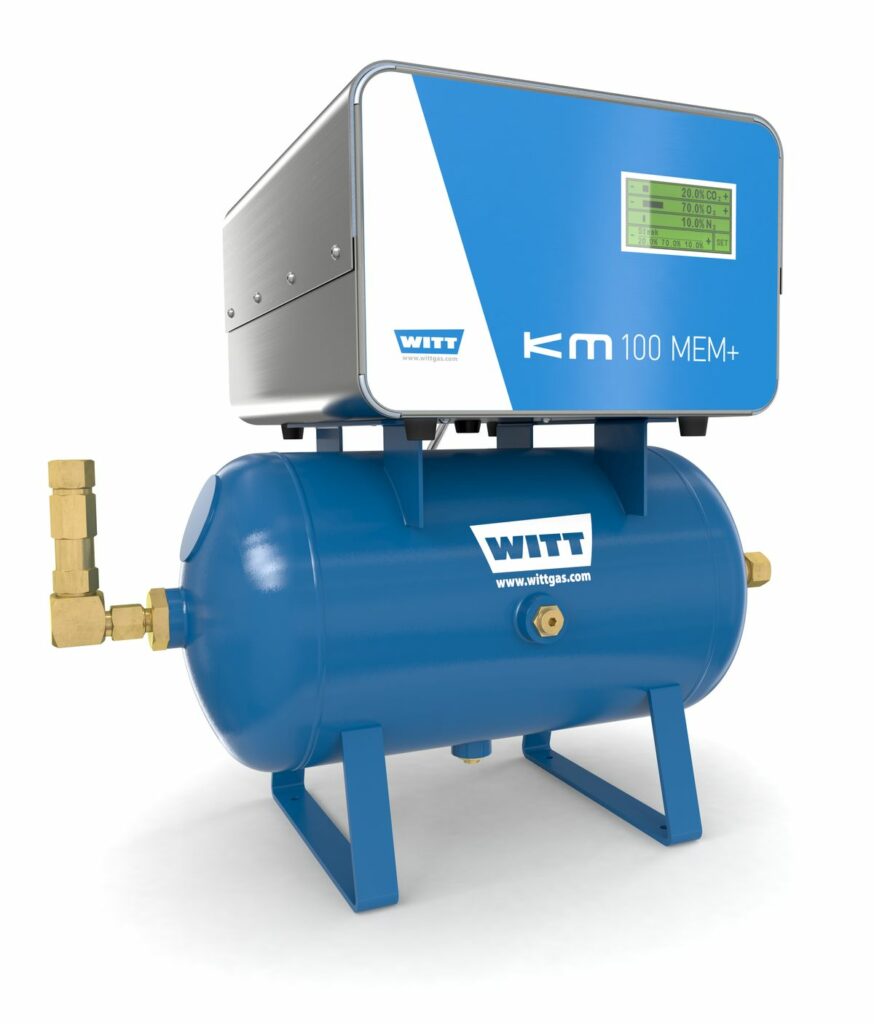
Gas mixer with electronic controlled mixing valves and buffer receiver
Gas mixers or gas blenders have been used for a long time and have proven themselves in countless applications. The technology is perfect and reliable. In line with the diverse applications, there is a wide range of gas mixers and gas metering systems. You can choose various mixing technologies and equipment classes, from portable gas mixers to complex gas mixing systems for central gas supplies.
Leading supplier WITT-Gasetechnik offers a comprehensive range of gas mixers.
Do you have questions about gas mixers? We would be pleased to advise you. Or you know exactly what you need and would like a concrete offer? Send us your inquiry now. Quickly and without obligation.
Mixing units offer many advantages
You are currently viewing a placeholder content from Default. To access the actual content, click the button below. Please note that doing so will share data with third-party providers.
Many typical mixtures of different gases for industrial applicationsare already available on the market as pre-mixed gases. But you can produce mixed gas individually – with gas mixers. The use of gas mixers offers numerous advantages over ready mixes:
- Homogeneity / Quality
- Flexibility
- Economics
Gas Mixer Homogeneity / Quality
Gas mixers produce gas mixtures of the highest quality. A special feature is above all the consistent homogeneity of the gas mixtures. The use of gas mixers excludes a layer formation, as it can occur in gas cylinders in pre-mixed gas mixtures. This consistent quality of the mixed gas offers optimum process reliability.
Gas Mixer Flexibility
Gas mixers offer maximum flexibility in terms of mixing ratio, gas quantity and place of use. The user can always produce exactly the gas mixture that he needs. No matter when, where and how much. Particularly useful is the use of gas mixers when working with frequently changing gas mixes. Within a few seconds, you can change the mixture setting.
Gas Mixer Economics
Last but not least, with gas mixers you can achieve cost advantages. Pre-mixed gases are often more expensive than individual gases. If you produce your gas mixtures by yourself, you can benefit from these lower purchase prices of standard gases. Such as nitrogen, carbon dioxide, argon or hydrogen. Due to larger order quantities it’s possible to achieve price advantages. Additional a complex storage and the time-consuming handling of the various gas cylinders are no longer necessary when using gas mixers.
These types of blenders are available
There is a large range of equipment for mixing gases. From the small, portable gas mixer for mobile use to the stationary gas supply system for industrial applications with high gas consumption. Depending on the requirements, there are models that can mix two, three or even more gases. There are also no limits in terms of gases: gas mixers for example for argon (Ar), helium (He), nitrogen (N), carbon dioxide (CO2) or oxygen (O) are just as standard as for fuel gases like acetylene (C2H4), propane (C3H8), methane (CH4) or hydrogen (H). Of course, the mixers for the Ex-area (explosion-proof) must be specially designed. Also with regard to the gas mixing process, different variants are available.
This is how gas mixers work
How does a gas mixer produce the mixed gas? The answer: it depends on the gas mixing technology that is used. Four different ways to mix gases are common:
- Mechanically
- Electrical
- Pneumatic
- By means of mass flow controllers (MFC)
Mixing gas with mechanical mixing valve
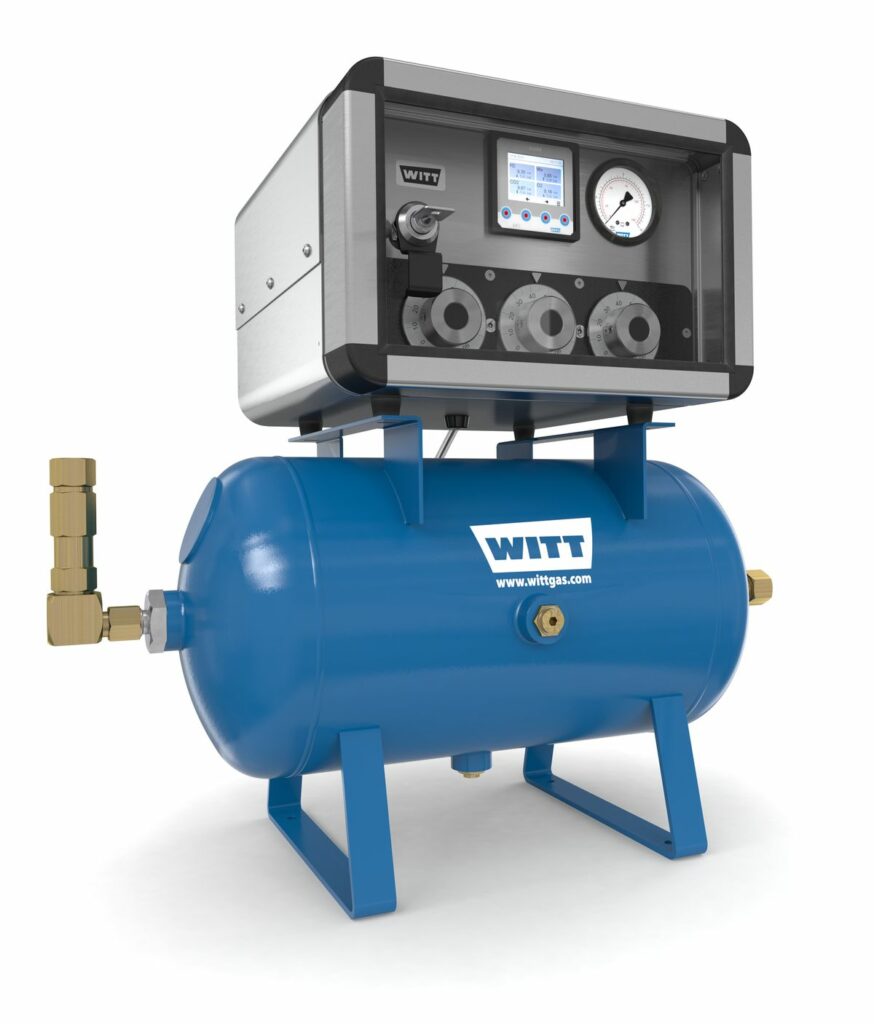
Gas mixer with mechanical mixing valves and buffer tank
Mechanical gas mixing valves are available in two versions: as a metering valve or as a proportional valve. Ideal for 2-gas mixtures are proportional valves. These have two gas inlets and one gas outlet. Inside the valve is a combination of a piston and orifices. When the valve is turned, the flow rate of one gas is increased by the piston and the flow rate of the other gas is simultaneously reduced proportionally. In this way, the desired gas mixture is formed at the outlet of the proportional valve. With 3 or more gases, you use simpler mechanical metering valves. For each gas one valve is necessary. Inside again work a piston and an orifice. Depending on the valve rotation, the piston opens or closes the orifice and allows more or less gas flow. By adjusting the individual valves results the required mixture.
Mixing with electric mixing valve
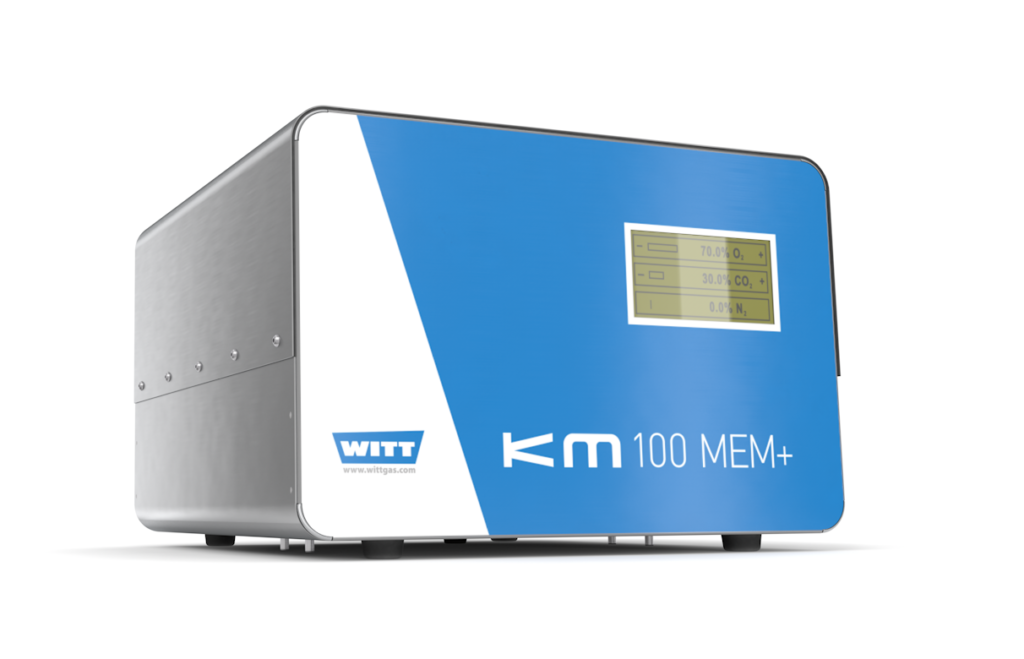
Gas mixer with electrical mixing valves
In principle, electrical mixing valves are the same components as mechanical mixing valves. For 2-gas mixtures, a proportional valve is used, which simultaneously modifies the flow of two gases. With more than two gases, you have a separate valve for each gas. In both cases, a piston closes or opens an orifice and thus regulates the amount of gas flowing through it. Unlike purely mechanical valves, the valve position is not changed manually, but with the help of electric motors. An electronic control operates the electric motors.
Mixing with pneumatic flow regulator
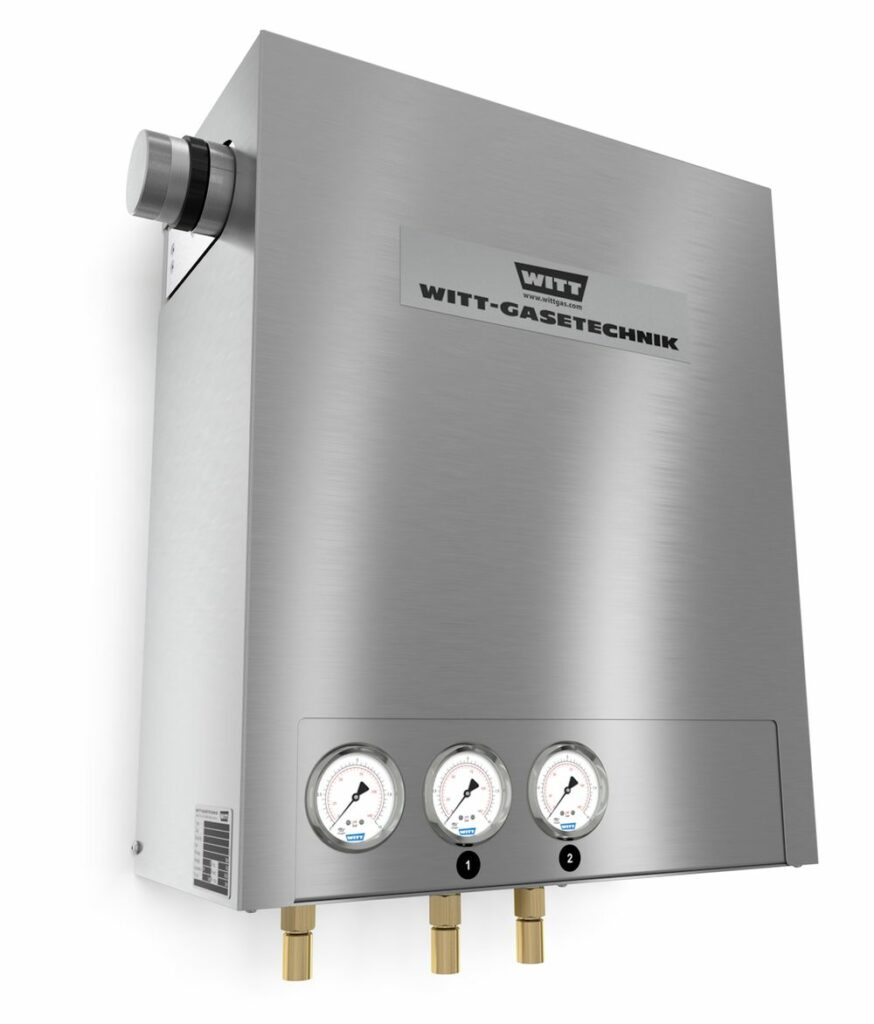
Gas mixer with pneumatic flow regulator and flexible gas mixture
Unlike mechanical or electrical mixing valves, gas mixers with a pneumatic flow regulator do not work with the piston and orifice. Instead, a porous body regulates the gas flow of each gas. Depending on the required amount of gas, the gas is passed through a smaller or larger part of this porous body via a knob. A separate flow regulator controls each gas. The interaction of the regulators produces the required gas mixture.
Mixing with mass flow controllers (MFC)
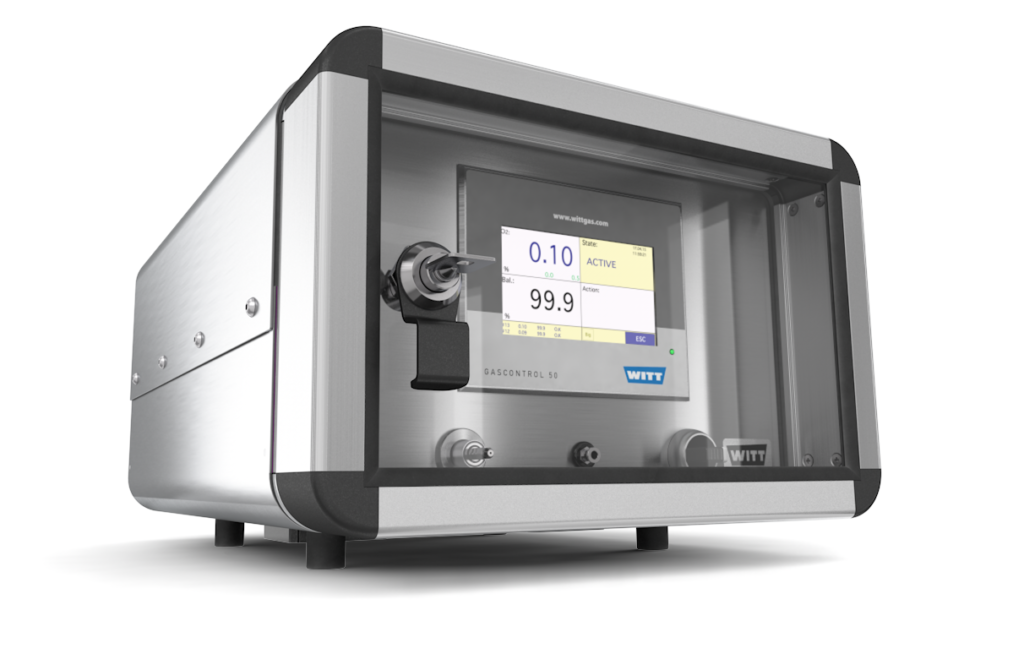
MFC gas mixer using mass flow controllers
A gas mixer variant that has become more popular in recent years uses mass flow controllers (MFCs). MFC mixers regulate the volume flow of each individual gas involved. For each gas one mass flow controller is required. By means of thermal conductivity, the volume flow is detected and regulated. The total of the individual gas flows finally gives the mixture.
What is the best way to mix gases?
Mechanical, electrical, pneumatic or mass flow – which of the different gas mixing processes is best? You can only answer with ‘It depends.’ There is no such thing as the best gas mixer. The selection of the right device depends on the application and the related requirements. Each mixing method has characteristic properties. The application determines if the advantages and disadvantages are relevant..
Gas mixers / metering can be found in many applications
You can use gases, gas mixtures and gas mixers almost everywhere. Typical areas for gas mixing devices are:
- Welding and cutting
- Heat treatment of metals
- Laser technology
- Modified Atmosphere Packaging
- Beer packaging and beer dispense
- Glassmaking
- Medical Air / Synthetic Air
- Nitrous oxide sedation
- Diving
- Helium leak test
- Odorization of gases
WITT is the leading manufacturer of mixing and metering systems
WITT offers high-quality gas mixing and gas metering systems for two, three or more gases. Also for high consumption and highly fluctuating withdrawals suitable models are available. The WITT program provides gas mixers for almost all types of and different performance ranges. The company uses all common mixing techniques: mechanical or electronic gas mixers are available as well as MFC’s or pneumatic flow regulators.
Gas Mixing Systems from WITT – Safety Components and Options
On request, WITT can optimize its gas mixers with numerous options and components to meet your requirements:
- Pressure Equalizing System
- Inlet Pressure Monitoring with Alarm Module
- Gas Analysis
- Gas Receivers
- Non-Return Valves
- Flashback Arrestors
- Pressure Safety Relief Valves
- Gas Filters
WITT and WITT mixers / blenders meet standards
Of course, WITT and WITT products meet international relevant standards. For example: DIN EN ISO 9001, DIN EN ISO 22000, ATEX 94/9/EC and PED 97/23 EC. An extensive quality management system guarantees the highest WITT quality you can trust.
Your individual gas mixing device from WITT
You have not found the right gas mixer yet? No problem: on request we manufacture your individual gas mixer. Step by step, we develop your special solution with you – tailor-made to your needs.
Talk to us about your requirements! Use our contact form!
You can find more about gas mixers at www.wittgas.com.